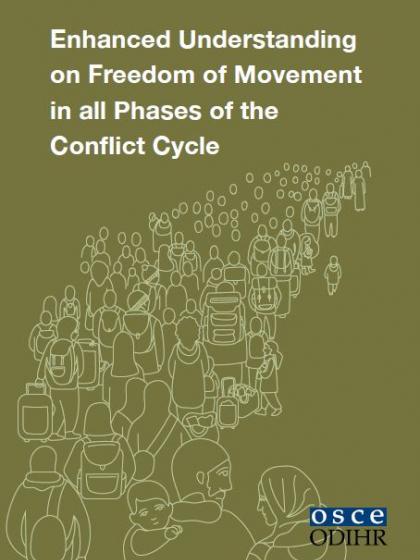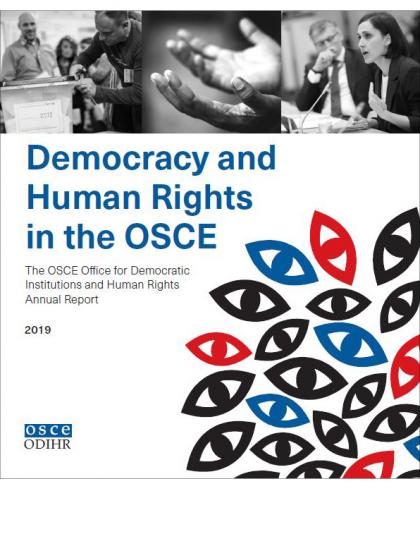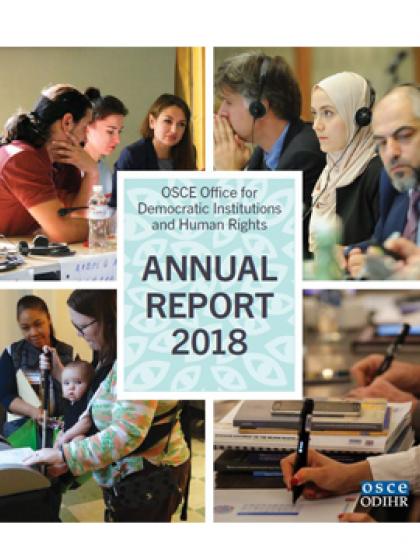Publications
Enhanced Understanding on Freedom of Movement in all Phases of the Conflict Cycle
Publishing date: 7 November 2023
Content type: Guide / manual / handbook
Where we are: OSCE Office for Democratic Institutions and Human Rights
What we do: Democratization, Border management, Migration
Publisher: Organization for Security and Co-operation in Europe
Since the Helsinki Final Act of 1975, the OSCE region has experienced a number of conflicts that have not only destabilized the region but have also had a very negative impact on human rights and fundamental freedoms, triggering grave humanitarian consequences and human suffering. Unfortunately, the tensions, crises and conflict situations continue to this day. In 2023, according to UNHCR, displacement has reached approximately 27 million, including internal displacement within the OSCE region. This number includes those displaced from Ukraine since February 2022. At times of conflict, protection under International and Regional Human Rights Law and International Refugee Law is complemented by the protection offered under International Humanitarian Law, all mirrored in OSCE Commitments.
Factsheet: OSCE Presence in Albania
Publishing date: 13 June 2023
Content type: Factsheet
Where we are: OSCE Presence in Albania
What we do: Combating trafficking in human beings, Democratization, Economic activities, Border management, Cyber/ICT Security, Environmental activities, Human rights, Conflict prevention and resolution, Education, Elections, Good governance, Countering terrorism, Gender equality, Media freedom and development, Migration, Policing, Youth, Rule of law, Tolerance and non-discrimination
Publisher: Organization for Security and Co-operation in Europe
The mandate of the OSCE Presence in Albania is to promote democratization, the rule of law, and human rights as well as to consolidate democratic institutions in line with OSCE principles, standards and commitments.
OSCE Human Dimension Commitments: Volume 2, Chronological Compilation (4th Edition)
Publishing date: 27 April 2023
Collections: OSCE Human Dimension Commitments - 4th Edition
Content type: Book
Where we are: OSCE Office for Democratic Institutions and Human Rights
What we do: Combating trafficking in human beings, Democratization, Human rights, Good governance, Gender equality, Migration, Roma and Sinti, Youth, Rule of law, Tolerance and non-discrimination
Publisher: Organization for Security and Co-operation in Europe
This volume presents chronologically the OSCE's human dimension commitments over its 30-year history. It is intended for use by government officials and civil society organizations, academics, students, and practitioners alike.
OSCE Human Dimension Commitments: Volume 1, Thematic Compilation (4th Edition)
Publishing date: 27 April 2023
Collections: OSCE Human Dimension Commitments - 4th Edition
Content type: Book
Where we are: OSCE Office for Democratic Institutions and Human Rights
What we do: Combating trafficking in human beings, Democratization, Human rights, Good governance, Gender equality, Migration, Roma and Sinti, Youth, Rule of law, Tolerance and non-discrimination
Publisher: Organization for Security and Co-operation in Europe
This volume is arranged thematically according to the main issues related to the human dimension. It is intended for use by government officials and civil society organizations, academics, students, and practitioners alike.
Democracy and Human Rights in the OSCE: The ODIHR Annual Report 2022
Publishing date: 16 March 2023
Collections: ODIHR Annual Reports
Content type: Annual report
Where we are: OSCE Office for Democratic Institutions and Human Rights
What we do: Combating trafficking in human beings, Democratization, Human rights, Education, Elections, Gender equality, Migration, Reform and co-operation in the security sector, Roma and Sinti, Youth, Rule of law, Tolerance and non-discrimination
Publisher: Organization for Security and Co-operation in Europe
This report highlights the impact of activities carried out by the OSCE Office for Democratic Institutions and Human Rights (ODIHR) in 2022.
What is ODIHR?
Publishing date: 28 June 2022
Content type: Factsheet
Where we are: OSCE Office for Democratic Institutions and Human Rights
What we do: Combating trafficking in human beings, Democratization, Human rights, Education, Countering terrorism, Gender equality, Migration, Roma and Sinti, Rule of law, Tolerance and non-discrimination
Publisher: Organization for Security and Co-operation in Europe
This factsheet provides key information about the OSCE Office for Democratic Institutions and Human Rights (ODIHR), its mandate and its areas of activity.
Shaping Balanced Political Discourse and Constructive Narratives on Migration: Guidance and Good Practice from the OSCE Region
Publishing date: 5 November 2021
Content type: Guide / manual / handbook
Where we are: OSCE Office for Democratic Institutions and Human Rights
What we do: Migration
Publisher: Organization for Security and Co-operation in Europe
With the aim of encouraging constructive and human rights-centred political discourse, thisguidance targets national, regional and local political leaders and decision-makers. This guidanceis built around three ‘Rs’, designed to help politicians and government officials: • Resist pressure to
Gender responsive short-term visa policies: Overview of practices in the OSCE region and recommendations for improvement
Publishing date: 24 August 2021
Collections: Archive of migration-related resources
Content type: Study / report
Where we are: OSCE Office for Democratic Institutions and Human Rights
What we do: Democratization, Migration
Publisher: Organization for Security and Co-operation in Europe
Report from online meeting on 30 June 2021.
OSCE/ODIHR Annual Report 2019
Publishing date: 19 March 2020
Collections: ODIHR Annual Reports
Content type: Annual report
Where we are: OSCE Office for Democratic Institutions and Human Rights
What we do: Combating trafficking in human beings, Democratization, Human rights, Education, Elections, Good governance, Countering terrorism, Gender equality, Migration, Policing, Reform and co-operation in the security sector, Roma and Sinti, Youth, Rule of law, Tolerance and non-discrimination
Publisher: Organization for Security and Co-operation in Europe
This report highlights the impact of activities carried out by the OSCE Office for Democratic Institutions and Human Rights (ODIHR) in 2019.
OSCE/ODIHR Annual Report 2018
Publishing date: 7 March 2019
Collections: ODIHR Annual Reports
Content type: Annual report
Where we are: OSCE Office for Democratic Institutions and Human Rights
What we do: Combating trafficking in human beings, Democratization, Human rights, Education, Elections, Gender equality, Migration, Roma and Sinti, Youth, Rule of law, Tolerance and non-discrimination
Publisher: Organization for Security and Co-operation in Europe










